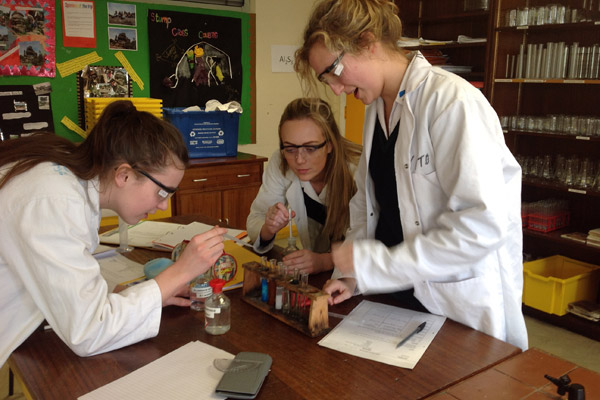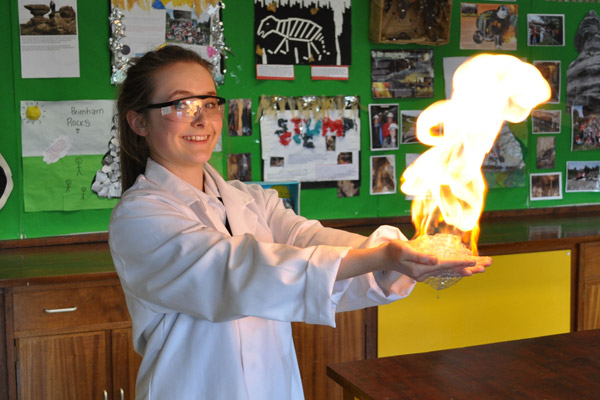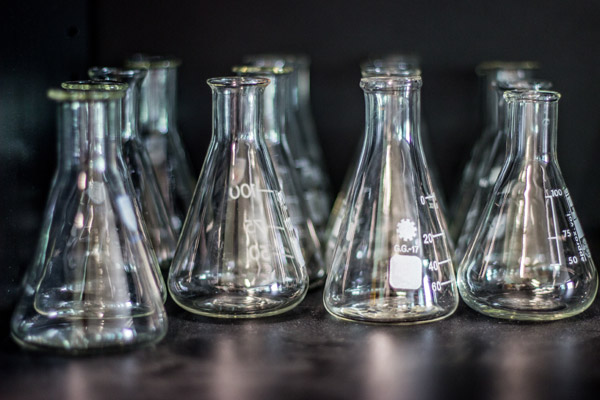“CHEMISTRY ITSELF KNOWS ALTOGETHER TOO WELL THAT – GIVEN THE REAL FEAR THAT THE SCARCITY OF GLOBAL RESOURCES AND ENERGY MIGHT THREATEN THE UNITY OF MANKIND – CHEMISTRY IS IN A POSITION TO MAKE A CONTRIBUTION TOWARDS SECURING A TRUE PEACE ON EARTH.”
Kenichi Fukui: co-recipient of the 1981 Nobel prize for Chemistry
Chemistry is the study of the materials that make up the world around us and how they behave. Chemistry is in the food you eat, clothes you wear, the water you drink, medicines, air, cleaning products… you name it. Chemistry is sometimes called the “central science” because it connects other sciences to each other, such as biology, physics, geology, and environmental science. Some of the best reasons to study Chemistry include:
- Chemistry helps you to understand the world around you. Why are plants green? What is in soap and how does it clean? These are questions that can be answered using Chemistry.
- A basic understanding of Chemistry helps you to read and understand product labels and see past the claims made in product advertisements. If you understand how Chemistry works you’ll be able to separate reasonable expectations from pure fiction.
- A command of Chemistry can help keep you safe! You’ll know which household chemicals are dangerous to keep together or mix and which can be used safely.
- Chemistry teaches useful skills. Because it is a science, learning Chemistry teaches you how to be objective and how to reason and solve problems.
- Chemistry is fun! Chemistry experiments don’t just go bang. They can glow in the dark, change colors, produce bubbles and change state.
What We Cover In Years 7-9
At Teesside High School we are in a fortunate position that our small class sizes enable us to include a great deal of practical work into our lessons, which helps to develop our students’ practical skills as well as their enthusiasm. We firmly believe that Chemistry is a practical subject and we work closely with the Biology and Physics departments to ensure that our courses are structured to allow students to develop the investigative skills that are essential for further study in any of the sciences.
In Year 7, our first topic is titled “Introduction to Chemistry”, where students learn how to select and safely use a variety of laboratory equipment and chemicals. This is followed by a topic on “The States of Matter” using the particle theory to explain the properties of solids, liquids, and gases, as well as investigating changes of state. Later in the year, we study “Mixtures and Solutions” which includes selecting practical techniques to separate a variety of mixtures. Our final topic is “Acids and Alkalis” which looks at both household and laboratory chemicals and introduces the pH scale and the use of indicators.
In Year 8 we benefit from an increased lesson allocation in Chemistry and so are able to extend students significantly. Our topics include “The Periodic Table”, “Elements and Compounds”, “Fuels and Fire”, “Formulae and Equations” and “Reaction of Acids”. The formulae and equations topic in particular, whilst beyond the KS3 curriculum, gives our students an early introduction to concepts that are vital at GCSE level and beyond.
In Year 9, our topics become longer and include more detailed study at GCSE level. Whilst this does place more demand on our students, we believe that the extra experience this provides enables our students to perform at a higher level in their GCSE examinations at the end of Year 11. The first two topics “The Reactivity Series” and “Rates of Reaction” include a significant amount of practical work, whilst “Atomic Structure” is a more theoretical topic.
What Do We Do At GCSE?
Students entering Year 10 at Teesside High School from September 2015 onwards will be taking the International GCSE in either Double Award Science (worth two GCSEs) or each individual science separately, giving three GCSEs.
In either case, students will have separate lessons of Physics, Chemistry and Biology taught by subject specialists. Those students taking the three sciences separately will have more lesson time in each subject.
The International GCSE is a respected qualification, offered by Edexcel, and adopted by many independent schools looking for stability when British GCSEs are increasingly subject to change.
One advantage of the International GCSE is that all topic areas are covered regardless of which option is chosen so that students choosing to take Double Award will not have any major gaps in their knowledge. Instead, students taking separate Chemistry GCSE will cover a little bit extra (generally the more demanding concepts) in each topic area.
The written exam papers can only be taken in Year 11, after all of the course has been taught. For students taking Double Award, they will take Paper 1 (2 hours) for each of Chemistry, Physics, and Biology. For students taking the three separate sciences, they will also take Paper 2 (1 hour) in each subject. Paper 2 will cover the more demanding concepts in each subject.
Another advantage is that students do not need to select a higher or foundation tier paper. Each examination paper is designed to cover the full range of grades.
Although there is a little more content in the International GCSE, there are no controlled assessments that take a lot of time during lessons. Instead, students are expected to perform a number of experiments as part of their everyday lessons (which we already do) and questions related to these will appear in the written examination papers.
The Specification for Chemistry is divided into five main sections:
Section 1: Principles of Chemistry
- States of matter
- Atoms
- Atomic structure
- Relative formula masses and molar volumes of gases
- Chemical formulae and chemical equations
- Ionic compounds
- Covalent substances
- Metallic crystals
- Electrolysis
Section 2: Chemistry of The Elements
- The Periodic Table
- Group 1 elements – lithium, sodium, and potassium
- Group 7 elements – chlorine, bromine, and iodine
- Oxygen and oxides
- Hydrogen and water
- Reactivity series (already covered before Christmas in Year 9)
- Tests for ions and gases
Section 3: Organic Chemistry
- Introduction
- Alkanes
- Alkenes
- Ethanol
Section 4: Physical Chemistry
- Acids, alkalis, and salts
- Energetics
- Rates of reaction
- Equilibria
Section 5: Chemistry in Industry
- Extraction and uses of metals
- Crude oil
- Synthetic polymers
- The industrial manufacture of chemicals
More information about both the Double Award and the Chemistry qualifications can be obtained from the Edexcel website:
What Do We Do At A-Level?
Students entering Year 12 at Teesside High School from September 2015 onwards and selecting Chemistry as one of their subjects will be taking the OCR Specification A (AS = H032, A-Level = H432). This is a traditional style Chemistry course, very closely based on the current, successful OCR AS and A-Level (H034, H434) which is offered by many independent and state schools and colleges locally and nationally.
A summary of the content for the A level course is as follows:
Module 1 – Development of practical skills in chemistry
Practical skills assessed in a written examination
Practical skills assessed in the practical endorsement – throughout the course, 12 of the practicals we do will be formally assessed and the results of these assessments will determine whether a student gains a pass or fail for the practical endorsement.
Module 2 (AS and A-Level) – Foundations in chemistry
Atoms, compounds, molecules, and equations
Amount of substance
Acid-base and redox reactions
Electrons, bonding, and structure
Module 3 (AS and A-Level) – Periodic table and energy
The periodic table and periodicity
Group 2 and the halogens
Qualitative analysis
Enthalpy changes
Reaction rates and equilibrium (qualitative)
Module 4 (AS and A-Level) – Core organic chemistry
Basic concepts
Hydrocarbons
Alcohols and haloalkanes
Organic synthesis
Analytical techniques (IR and MS)
Module 5 (A-Level only) – Physical chemistry and transition elements
Reaction rates and equilibrium (quantitative)
pH and buffers
Enthalpy, entropy and free energy
Redox and electrode potentials
Transition elements
Module 6 (A-Level only) – Organic chemistry and analysis
Aromatic compounds
Carbonyl compounds
Carboxylic acids and esters
Nitrogen compounds
Polymers
Organic synthesis
Chromatography and spectroscopy (NMR)


